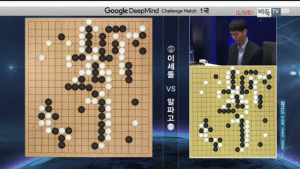So what is artificial intelligence (AI) anyways? Just as humans scientifically exhibit what we call “natural learning”, artificial intelligence gives machines the same essence of knowledge enhancement called “machine learning”. AI allows machines to think about previous experiences and predict future unseen data without humans explicitly programming them to do so. So does that mean one day they will accumulate enough learning material to outsmart the creators? If so, scientists hypothetically refer to this as “super intelligence”.

Photo Credit: ProSysCom
Google AI: Alphago phenomenon
Go is an abstract strategy board game, created by humans more than 2,500 years ago. AlphaGo AI developed by Google, astonishingly defeated the world’s best Go players. AlphaGo not only defeated them, but impressively “trained on 160,000 games recorded from top Go players and then on 30 million more games it played against itself” said Brenden Lake. Clearly, the AI was able to train repeatedly at speeds unachievable by humans, learned from them and invented moves that no human has played before.

Photo Credit: Fiuba Consulting Club
http://fiubaconsulting.club/go-game-board/
So is AlphaGo considered a type of “super intelligence”?
Not quite. AlphaGo’s knowledge was encapsulated to the game Go, and only Go. It has no other signs of expanding into solving chess, checkers or anything else. Therefore we can state that although AlphaGo have officially outclassed humans at Go, it is not a “super intelligence”.
From within our phones, laptops to Google Homes and Amazon Alexa, AI is in our daily lives. We as humans tend to be skeptical of the unknown, and it is no different with AI. The lack of understanding of the general public is sole reason these topics to arise. Although AI does allows a machine to learn tasks without a human’s guidance, but at the end of the day it comes down to highly statistical algorithms. In the nutshell of AI, it’s primary function is to recognize relationships amongst enormous data to predict relevant, measurable answers. Hence over time, as new data comes in and joins the statistical model, its able to “learn” and perform even more accurate predictions for the future.
“Machine learning and artificial intelligence are tools. They can be used in a right or a wrong way, like everything else.” – Brenden Lake
Ultimately, AI’s capability to learn at speeds beyond any human doesn’t implicitly mean it will secretly learn other intelligence as well to outsmart us. There simply is no definition of “natural learning” for humans yet, therefore “machine learning” also cannot possibly surpass such threshold and go beyond our capabilities. Hence, AI will only learn and be exceptional in the field they are designed to thrive in. Even if AI one day is able to learn outside of it’s design specifications, it doesn’t necessarily mean it will be successful either. As we are only understand the surface of AI’s true powers, its difficult to predict what other possibilities exist, but taking over the world is improbable.
– Jason Gan
